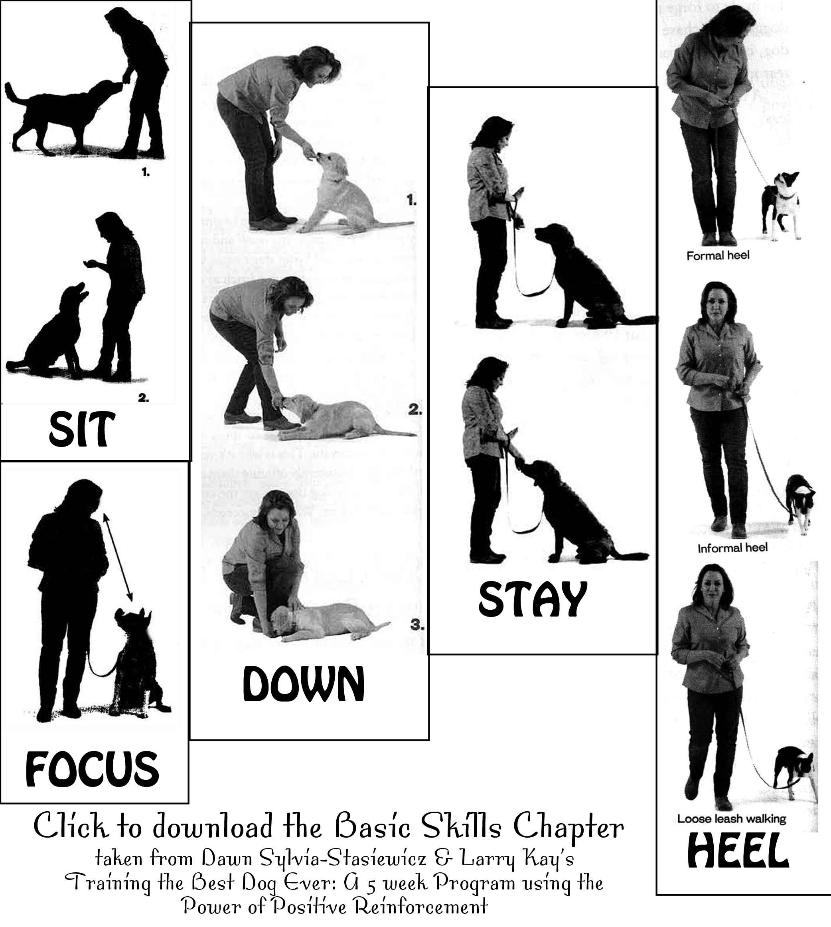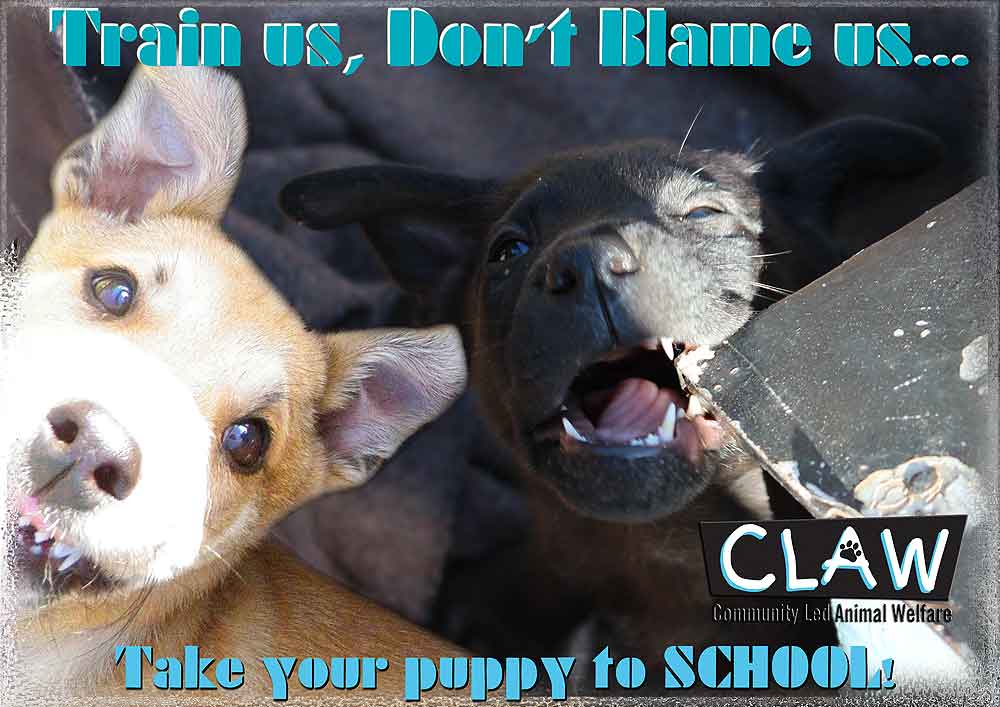Helping Shelter Pups learn manners, life skills and adaptive coping mechanisms.
- A Feeding Routine. It really is important to monitor feeding and feed on a schedule so our rescue pups do not develop a need to become defensive or competitive around food. It offers training opportunities and if one of the pups were reluctant to eat it would be an early clue he may be getting sick. Preferably and where possible, their food should be used to reinforce manners, good behaviour and positive leaning. Food must be associated with the presence of people and of happy calm social interaction. Ideally each pup should be monitored and given separate bowls of good quality food (rather than a large communal bowl) at set times during the day (age dependent feeding schedule). Feeding time provides a great opportunity to practise some basic obedience and is a good time to bond - puppy learns to associate humans with food and positive experiences. It helps us prevent food guarding (and possessiveness of other resources such as toys) which could potentially become serious behavioural issues and result in food aggression. Perhaps CLAW can get food dispensing toys donated (or sponsored) if it's impossible to personally feed each pup (rather than have free and communal access to food)! It has been shown that using food to train and hand feeding or chew toy, food dispensing toys (as environmental enrichment, when the puppy is crated (or in his/her cage) enhances the eating experience!
- Potty Training (it is important for us to have as much of a consistent routine and at least know HOW to potty train, including realising the importance of them learning a substrate preference for the surface on which they urinate and defecate. At least when armed with knowledge and awareness we can try, as routinely as possible, to let the pups go to the toilet outside and preferably on grass!)
- Crate Training (young CLAWbies often get used to cages/crates from quite a young age, but as a result of space limitations they almost always share a crate/ cage). Crate training is less popular in South Africa than overseas. During the day, a puppy can be crated the same proportion of day as their age in months (e.g. an 8week old pup can be crated for 2 hours and a 12 week old for 3 hours during the day.
Sensory Stimulation:
Unfortunately growing up in a shelter environment may disadvantage rescue pups. If they are in the sterile environment of the clinic or contained in secluded huts or containers they may suffer from sensory deprivation which may disadvantage them when going out into the real world. It remains a delicate balance protecting the pups from illnesses or parasites that are likely in a clinic and treatment facility and preventing them from participating in shelter life and interacting with staff, visitors and resident animals. Puppies need to be exposed to a variety of relevant stimuli (at an appropriate intensity, and moderately increasing levels so as not to overwhelm them) so that they get used to sudden noises such as doors slamming, household appliances and machinery operating, traffic, telephones, alarms or doorbells ringing, thunderstorms, fireworks, gunshots, vuvuzelas, shouting, babies crying, children laughing etc. Before the age of 4 months pups acclimate quickly and accept the new stimuli, quickly adding new stimuli, experiences and situations to their repertoire. Something that is novel or very exciting can become dull as a puppy gets used to it. The tendency for decreased responsiveness to something is called habituation. If puppies are not exposed to these stimuli and sensations in the first four months, they are more likely to react with excitement or anxiety, fear and trepidation, and may even develop behavioural problems (excessive chewing) or phobias (e.g. of fireworks or thunderstorms) which would then require behavioural remediation in the form of de-sensitisation. (A few resources to help if things go wrong).
Download my puppy habituation MP3, a 20 minute soundtrack of everyday noises which can regularly played in the puppy pen (or hut, room, kennel run, container) where the pups are housed in the shelter.
Basic Manners and obeying simple commands:
Puppies need to learn basic manners and how to obey simple commands such as sit, down, stay and to come when called. In addition they need to learn to meet and greet politely (not jump-up, scratch or bowl over) , walk on a loose leash, calm down or settle etc. As discussed earlier on the Reward Pup page, we are moulding the RP into a calm, polite pup who will adapt to new boundaries and house rules and become a cherished member of a family. Training and learning are to bolster growth and development and boost confidence and strengthen the human-canine bond! The RP will learn to trust humans and trust in himself. He will learn confidence and self-control by knowing his place and how to fit into a home environment and family unit.
Some of the most important things you can teach the Rescue Pup to do in Puppy Training, include:
- Come when called (a reliable Recall) - this can truly be the difference between life and death (think of the Rinkaals that visited CLAW?!) (See how to train a real reliable recall)
- "Sit", lie "down" and "stand" on cue (verbal commands) (see Come, Sit Down, Stay .PDF)
- Walking at your side on a loose lead (no pulling)
- "Wait" and "Stay" (e.g. so the puppy waits until you put his leash on before jumping out of the car; or puppy stays inside the gate until you return from fetching the newspaper)
- "Settle" (learn to temper his excitement and calm down) (see Hyper Dog .pdf)
- "Take" and "Leave" (e.g. so you can ask the pup to leave the shoe he is chewing and take the rawhide bone instead) (see Destructive Chewing .PDF)
- Allow people and other pets near resources such as food and toys (see Food Guarding)
- Bite inhibition (learning to have a soft mouth and to stop play biting)
- Be sociable around different kinds of adults and children, and enjoy the social interaction and being handled (see Fear Of People .PDF)
- Polite, calm meeting and greeting (without jumping up)
- Be sociable around other dogs and other pets and species
The Best Dog Ever has 10 Basic skills considered to be fundamental to basic training including the Sit, Recall, Leash Walking, Down ,Stay, Settle, Leave, Take and boundary training (click pic below to download the summary chapter... the link to buy the book is provided on my Home page)
As much as we need to educate our RP’s (make them adoptable and adaptable by teaching them social and life skills and coping mechanisms), we also need to educate our prospective adoptive parents (and puppy owners in general). They too need to recognise the vital importance of Puppy socialisation and early training. Just as we have the responsibility to a CLAWbie to make sure (s)he finds the best possible home for him/her, we must also make sure (through adoption advice and counselling) that the prospective adoptive parents (or “forever” family) make the right choice when adopting their lifelong companion. Adopting a Dog is the only time you get the opPAWtunity to choose a relative!… how true that is! That said though, our prospective adopters need to make an INFORMED choice, and adopt the RP that is the best possible fit with their lifestyle, expectations, rules of the home, activity level, daily routines, family composition (e.g. are there kids or other pets… now, or planned in the future) etc.
What we tend to forget is that ADOPTION is not in fact the “end of the line”! Our responsibility, as animal advocates and animal welfare workers, is to make sure that our pups, do actually get that “happily ever after forever home”! At all times, we need to focus on a preventative approach, and do everything in our power to make sure the puppy never becomes unwanted again! As we have already established, Puppy training and socialisation must happen! To be effective in our pre-adoption counselling (and help our RP transition into their new home and stay there as a lifelong member of the family) we must strongly advise the prospective adopters regarding the critical importance of Puppy School. We should advertise the reputable puppy schools (and especially those that promote animal welfare and adoption and offer discounts and some extra insight and understanding when schooling CLAWbies !)


